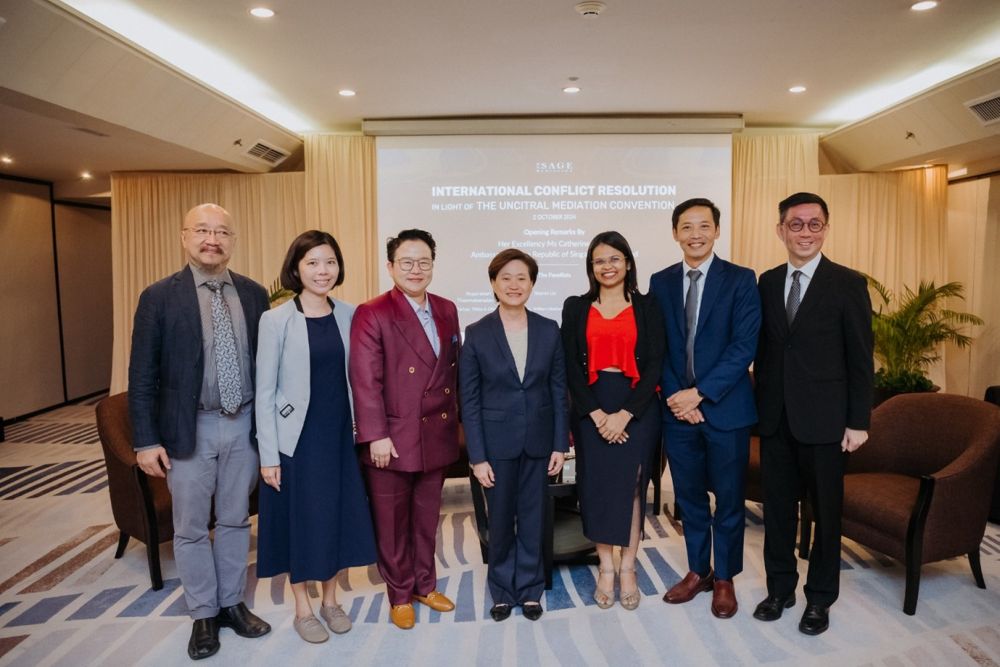- within Litigation, Mediation & Arbitration, Energy and Natural Resources and Intellectual Property topic(s)
- in European Union
- with readers working within the Chemicals industries
Thailand is emerging as a key player in alternative dispute resolution (ADR) in Southeast Asia, drawing attention for its robust legal framework, strategic positioning, and supportive culture for amicable dispute resolution.
At a recent international ADR event hosted by Sage Mediation in Bangkok, dispute resolution partner Sharon Lin represented Withersworldwide in a discussion on this topic, alongside other industry experts and dignitaries, including Her Excellency Ms. Catherine Wong, Singapore's Ambassador to Thailand.
The panel discussion delved into the factors underpinning Thailand's growing role in ADR, from institutional backing and international recognition to cultural and economic drivers.
Key insights from the discussion:
- Legal framework: Thailand has established a comprehensive legal framework for ADR, including mediation and arbitration. The Arbitration Act of 2002 and the Dispute Mediation Act of 2019 provide clear guidelines for dispute resolution processes.
- International recognition: Thailand is a member of various international agreements, such as the New York Convention on the Recognition and Enforcement of Foreign Arbitral Awards, which bolsters its credibility as an ADR center.
- Institutional support: Institutions like the Thailand Arbitration Center (THAC) offer resources, training, and support for ADR practitioners and users. (Withersworldwide dispute resolution partner Shaun Leong, FCIArb, is the Head of the Academy of the THAC).
- Cultural acceptance: Thai culture places a strong emphasis on harmony and conflict avoidance, making mediation and other non-adversarial methods more appealing for dispute resolution.
- Economic growth: As Thailand's economy continues to grow, so does the demand for effective dispute resolution mechanisms, particularly in sectors like trade, investment, and construction.
- Strategic location: Thailand's geographical location in Southeast Asia makes it accessible for businesses and individuals from neighbouring countries, enhancing its role as a regional hub.
- Government Initiatives: The Thai government has actively promoted ADR through policy initiatives, aiming to reduce the backlog of cases in the judiciary and encourage the use of mediation and arbitration.
- Training and education: Increased focus on training legal professionals in ADR methods has improved the quality of dispute resolution services available.
These factors collectively enhance Thailand's attractiveness as a destination for resolving disputes amicably and efficiently, catering to both domestic and international parties.
Ratifying the Singapore Convention on Mediation would position Thailand as a progressive leader in ADR, benefiting both its legal landscape and its economic development.
Implications for Asia
Beyond what was discussed at the event, Thailand's emergence as a hub for alternative dispute resolution (ADR) in Southeast Asia has far-reaching implications for the region, particularly as it strengthens its role as a bridge for cross-border business and legal cooperation. By positioning itself strategically, Thailand leverages its robust legal framework, cultural emphasis on mediation, and extensive network of trade agreements within ASEAN, making it an attractive forum for resolving international disputes.
In addition to Thailand's development, Asia's broader ADR landscape is enriched by established arbitration centers like the Hong Kong International Arbitration Centre (HKIAC), the China International Economic and Trade Arbitration Commission (CIETAC) and the Singapore International Arbitration Centre (SIAC). Sage Mediation and the Singapore Mediation Centre (SMC) also offer specialized mediation services to facilitate harmonious, cost-effective resolutions for commercial and cross-border disputes.
The growth of Thailand's ADR sector complements these centers by providing businesses across Asia with a reliable, neutral ground for conflict resolution. Thailand's commitment to improving infrastructure and cross-border connectivity enhances accessibility for regional stakeholders, and the government's support for ADR bolsters investor confidence by providing efficient alternatives to traditional litigation. This stability is particularly appealing for industries in high-growth sectors such as trade, technology, and infrastructure, where cross-border disputes are more likely to arise. Furthermore, Thailand's endorsement of frameworks like the ASEAN Economic Community and partnerships with major economies like China, India, and Japan enables smoother enforcement of ADR outcomes across Asia, promoting economic integration and reducing friction in intra-regional trade.
For businesses across Asia, Thailand's advancements mean faster, more cost-effective dispute resolution options that align with the legal and cultural nuances of the region, making it a valuable option in an increasingly interconnected Asian market. As part of Asia's ADR landscape, Thailand provides a complementary option to other established centers, allowing the region's dispute resolution mechanisms to evolve in a way that benefits domestic and international parties alike.

Left to right: Benjamin Pwee, Sharon Lin, Noppramart Thammateeradaycho, Catherine Wong, Sara Gunathilaka, Aloysius Goh, Lu Ting-Kwok (Photo taken at 'The Rising Popularity of Mediation-Arbitration and its Impact on International ADR Practice' event hosted by Sage Mediation in Bangkok)
Sharon Lin is a partner in the litigation and arbitration team and leads the Professional Liability practice group in Withers Khattarwong. She is an accredited Mediator with the Singapore International Mediation Institute (SIMI), an accredited Mediation Advocate with International Mediation Institute (IMI) and a Fellow of the Singapore Institute of Arbitrators (SIArb).
The content of this article is intended to provide a general guide to the subject matter. Specialist advice should be sought about your specific circumstances.

